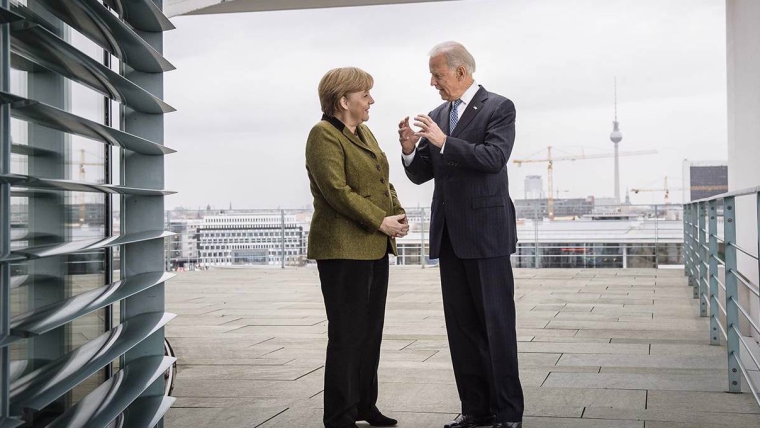
Joe Biden is about to embark on his first trip to Europe as US president. After a G7 summit in England, he will attend a NATO summit in Belgium and then a bilateral meeting with Russian President Vladimir Putin in Geneva. But while Europe will serve as the locale, the focus ultimately will be on China, because Biden’s strategic priority is to marshal a united Western response to Chinese behavior.
China’s increasing assertiveness and contempt for Europe has soured many European leaders’ views on President Xi Jinping’s regime, creating an opportunity that Biden dare not miss. Strange as it may sound, the Nord Stream 2 gas pipeline connecting Germany to Russia is now at the center of Biden’s efforts to woo Europe – particularly Germany – away from China.
For years, Biden derided Nord Stream 2 as a “bad deal for Europe,” arguing that it jeopardised the continent’s security, and particularly that of Poland, Ukraine, and the Baltic states. At his confirmation hearings in January, US Secretary of State Antony Blinken said the incoming administration was “determined to do whatever we can to prevent” the pipeline’s completion.
But US efforts to scupper Nord Stream 2 could have dealt a lethal blow to the transatlantic alliance, because German Chancellor Angela Merkel’s government regards Russian gas as Germany’s waystation for phasing out coal. In an unexpected about-face, the United States last month waived sanctions against the company that is building the pipeline. Since then, German Foreign Minister Heiko Maas has gushed about “the really excellent relations that we’ve built up with the Biden administration.”
To be sure, one of the biggest winners, for now, is Putin. With Nord Stream 2 delivering Russian gas directly to Germany via the Baltic Sea, the Kremlin will be able to cut off supplies to transit countries like Ukraine. But while there is no denying that Ukraine’s security, finances, and even independence have been cast into doubt, the Biden administration was wise to acknowledge that it could not stop the pipeline. It therefore decided to use acceptance of the project to gain more cooperation from Germany on US policy toward China.
For its part, China views Europe as even more decadent and sclerotic than the US, and it has been heaping abuse on the continent, even issuing individual sanctions against Dutch legislators and members of the European Parliament. In response, the European Parliament has blocked ratification of the draft Comprehensive Agreement on Investment (CAI), a deal that the European Commission agreed with China last December, openly spurning the incoming Biden administration’s request for prior consultations on the matter.
China’s assertiveness has given both Germany and the US the encouragement they needed to make a deal that will unify the West. The terms are already clear: Germany will get the pipeline and, ultimately, the climate policy it wants; the US will have Germany’s support in implementing a new China strategy and defending the rules-based international order.
Viewed in context, then, Biden’s concession on Nord Stream 2 was essentially cost-free. With the Germans determined to finish the project, US opposition would only have deepened divisions in the Western alliance. Unlike former President Donald Trump, with his bombastic deal-making and brinkmanship, Biden has recognized reality and extracted material benefits from it. The Europeans are now highly unlikely to allow implementation of the CAI anytime soon.
As for Putin’s Russia, Biden seems confident that the West has the capacity not only to contain it but perhaps to woo it away from China, too. There is a clear case to be made that increasing dependence on China is not in Russia’s national-security interest, and this is presumably the message that Biden will transmit to Putin in Geneva.
Trump didn’t think America needed allies in Europe to achieve its economic and political objectives. But Biden understands that the transatlantic alliance is a bedrock of US economic and national security. That is why he is willing to risk burnishing Russian economic interests in order to strengthen the West’s position vis-à-vis China.
Critics like Wolfgang Münchau of Eurointelligence view Biden’s policy as one “based on a misjudgment of German politics, which bodes ill for the chances of a successful Biden administration foreign policy.” In fact, anchoring Germany firmly within a Western united front to engage with China may prove to be one of Biden’s pivotal diplomatic achievements. If nothing else, it is a bold gesture that exorcises Trumpism from US foreign policy.
Melvyn Krauss is Professor Emeritus of Economics at New York University. Copyright 2021 Project Syndicate, here with permission.
3 Comments
As for Putin’s Russia, Biden seems confident that the West has the capacity not only to contain it but perhaps to woo it away from China, too. There is a clear case to be made that increasing dependence on China is not in Russia’s national-security interest, and this is presumably the message that Biden will transmit to Putin in Geneva.
Hmmm...
Foreign Minister Sergey Lavrov’s video address to the Sixth International Conference Russia and China: Cooperation in a New Era, Moscow, June 1, 2021
Getting Ready
Is NZ Navy Ready?
China’s assertiveness has given both Germany and the US the encouragement they needed to make a deal that will unify the West. The terms are already clear: Germany will get the pipeline and, ultimately, the climate policy it wants; the US will have Germany’s support in implementing a new China strategy and defending the rules-based international order..The Europeans are now highly unlikely to allow implementation of the CAI anytime soon.
Which nations can fill the gap if current German exports to China are suspended?
Which begs the question will Germany even accede to this possibility?
Hence BAU with China as far as German manufacturers are concerned.

We welcome your comments below. If you are not already registered, please register to comment.
Remember we welcome robust, respectful and insightful debate. We don't welcome abusive or defamatory comments and will de-register those repeatedly making such comments. Our current comment policy is here.